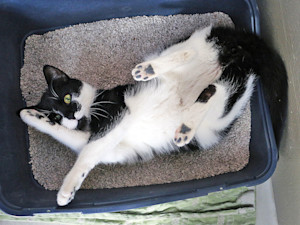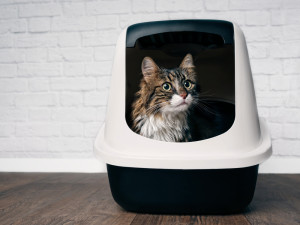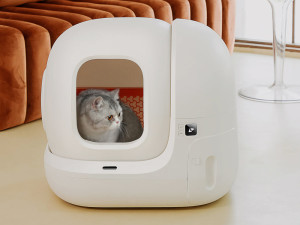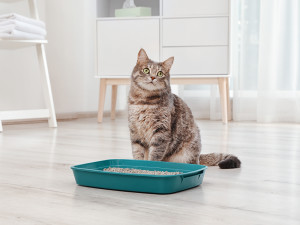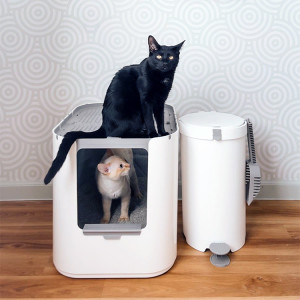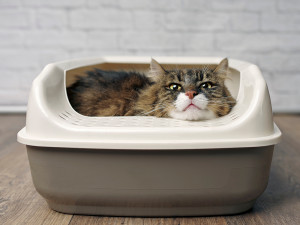Why Do Cats Bury Their Poop?
The instinct behind this behavior, explained.

Share Article
In This Article:
Is It Normal For Cats to Bury Their Poop? Origins of Burying Behavior In Cats Why Do Cats Bury Their Poop? How Burying Behavior Differs Between Single And Multi-Cat Households What Does It Mean if Your Cat Doesn’t Bury Their Poop? How Can I Get My Cat to Poop In the Litter Box? Frequently Asked Questions
You can learn a lot about someone from their bathroom habits, especially if that someone is a cat. While humans close the door, light a candle, or rely on perfumed sprays, cats take a different route: dig, do their business, then cover it up like a four-legged criminal trying to bury the evidence.
This behavior is packed with evolutionary significance, social strategy, and a hint of passive aggression. Whether your cat is a dainty digger or a proud non-burier, there’s a reason for it, and it started in the wild.
Is it normal for cats to bury their poop?
Yes, it’s totally normal, and in most cases, burying poop is a good sign. Burying their feces is an instinctive behavior in domestic cats, inherited from their wild ancestors. Their version of flushing the toilet and wiping the seat is polite, tidy, and evolutionarily prudent. If your cat buries their poop, it means they feel secure in their territory.

Origins of burying behavior in cats
The behavior dates back to wild felines like the African wildcat, the ancestor of today’s house cats. According to Pam Johnson-Bennett, a renowned cat behavior specialist, in the wild, dominant cats often expose their droppings to mark territory. In contrast, subordinate cats cover their poop to avoid confrontation or predator detection. Burying poop was a matter of survival: a concealed scent meant a lower chance of being tracked, attacked, or challenged.
Why do cats bury their poop?
There are a number of reasons cats bury their poop, including the following:
Personal hygiene and cleanliness
Cats are famously fastidious, and burying waste is part of their hygiene ritual. A covered litter box keeps their living space clean and smell-free, which matters greatly when you spend 16 hours a day napping near it.
Territorial instinct
Poop is power in the animal kingdom. It carries scent markers packed with information: identity, health, and even emotional state. By burying it, cats reduce the risk of alerting rivals or predators to their presence. It’s their stealth mode, enabled by paws and instinct.
Feline social hierarchy
Interestingly, burying can also be a submission signal. In multi-cat environments, subordinate cats are more likely to bury their waste, while dominant cats may leave theirs uncovered as a power move. So, if your cat is the only one not burying poop in a shared home, they might be the ruler of the roost — and they know it.
How burying behavior differs between single and multi-cat households
In single-cat households, most cats will instinctively bury their poop unless something is wrong. In multi-cat homes, however, things can get complex. If one cat always leaves their waste exposed, it could be asserting dominance. Meanwhile, the others may consistently cover theirs to avoid drama.
Litter box real estate becomes a key battleground for status, territory, and comfort. Experts recommend having at least one litter box per cat, plus one extra, to prevent turf wars.
What does it mean if your cat doesn’t bury their poop?
If your cat suddenly stops burying their poop, don’t dismiss it as laziness. It could signal:
Territorial assertion: Your cat may feel dominant or be reacting to a new pet.
Medical issues: Painful conditions such as arthritis can make digging uncomfortable.
Litter box aversion: Too small, too dirty, or scented litter might deter your cat from burying their poop.
Stress: Changes in routine or environment can disrupt normal behaviors.
A vet visit might be wise if not burying their poop is a new behavior and persists.
How can I get my cat to poop in the litter box?
Sometimes, the issue isn’t burying — it’s location, location, location. Here’s how to encourage good bathroom habits:
Use unscented, fine-grain litter. Many cats prefer it.
Keep the litter box clean. Scoop daily and wash weekly.
Offer options. Ideally have at least one box per cat, in quiet, low-traffic areas.
Avoid drastic changes. If you switch litter or box style, do it gradually.
Reward your cat when they use the box correctly. Positive reinforcement goes a long way.
Bottom line: Why cats bury their poop
Cats bury their poop as part of a deeply ingrained instinct rooted in hygiene, territory management, and social signaling. This behavior goes beyond simple cleanliness, reflecting their evolutionary heritage and complex communication methods.
FAQs
Why do cats smell their poop before burying it?
Cats smell their poop to check for health cues, recent dietary changes, or territory signals (even their own).
Which cats bury their poop?
Subordinate, domestic, and stealth-oriented cats usually bury their poop. Dominant or outdoor cats may leave it exposed.
Why do cats bury their poop but not dogs?
Cats evolved as solitary hunters and stealthy predators, while dogs are social pack animals that often use scent to communicate openly.
References:
Johnson-Bennett, Pam. “About Cat Behavior Expert and Author Pam Johnson-Bennett.” Cat Behavior Associates, https://catbehaviorassociates.com/about/opens in new tab
Bradshaw, John W. S., Rachel A. Casey, and Sarah L. Brown. The Behaviour of the Domestic Cat. 2nd ed., CABI, 2012. https://books.google.com/books/about/The_Behaviour_of_the_Domestic_Cat.html?id=jnAeAQAAIAAJopens in new tab
Leyhausen, Paul. Cat Behavior: The Predatory and Social Behavior of Domestic and Wild Cats. Garland STPM Press, 1979. https://archive.org/details/catbehaviorpreda0000leyhopens in new tab
McComb, Karen, et al. "The Influence of Social Context on the Use of Fecal Marking in the Domestic Cat." Applied Animal Behavior Science, vol. 160, 2014, pp. 84–91. https://www.sciencedirect.com/science/article/abs/pii/S016815911400142Xopens in new tab

Valerie Mellema
Valerie Mellema has a Bachelor of Science in Agribusiness and Equine Industry from West Texas A&M University. She has been a professional writer for the past 20 years, covering a wide variety of pet health and care topics before founding a nonprofit focused on mental health in children and thoroughbred aftercare. She has four Border Collies and eight retired racehorses.
Related articles
![a cat peeks out of a litter box lid]()
5 Litter Boxes Your Cat Likely Won’t Reject
Think like a cat when choosing a litter box... so you can go back to not thinking about litter boxes.
![cat in white electronic litter box]()
Finally, a Litter Box That’s Thought of Everything
An electric litter box for techy cat parents and their tactful felines.
![Cat sitting by its litter box]()
Your Cat Can’t Poop—What Now?
Here’s how to deal with cat constipation.
![Two cats with ModKat litter box.]()
The Best Litter Box Covers in 2024
Cover that sh*t up.
![A cat walking by a little box]()
Litter Robot: Will My Cat Use an Automatic Litter Box?
I introduced my cat to an automatic litter box, and let’s just say it went off with multiple hitches.
![Funny tabby cat sitting in a litter box and looking curiously outside.]()
Best Cat Litter in 2025: Low-Tracking, Dust-Free, Eco-Friendly
Helping your cat find their preferred litter doesn’t have to be a crapshoot.


